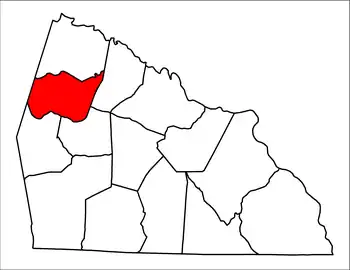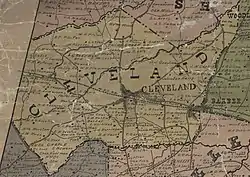Cleveland Township | |
|---|---|
 Location of Cleveland Township in Rowan County | |
 Cleveland Township in 1903 | |
| Country | United States |
| State | North Carolina |
| County | Rowan |
| Established in | 1868 |
| Government | |
| • Type | non-functioning county subdivision |
| Area | |
| • Total | 28.48 sq mi (73.8 km2) |
| Time zone | UTC-5 (Eastern (EST)) |
| • Summer (DST) | UTC-4 (EDT) |
Cleveland Township is one of fourteen non-functioning county subdivisions (townships) in Rowan County, North Carolina that were established in 1868. The township had a population of 2,817 according to the 2010 census.[1][2] The only incorporated municipality in Cleveland Township is the town of Cleveland.[3] Residents are served by the Rowan–Salisbury School System and the township is home to Mt Ulla Elementary School.
History
In 1831, the first post office in the general vicinity of present-day Cleveland was established. It was named Cowansville.[4] In 1850 before Western North Carolina (WNC) Railroad was built, the post office and thus the town in the vicinity of present-day Cleveland was called Rowan Mills, getting its name from a large five-story flour milled owned by Osborn Giles Foard (1820-1882), who was also the first Rowan Mills postmaster. After the construction of WNC Railroad, the railroad station was named Third Creek. The post office and town kept their name Rowan Mills until 1876, when the town was incorporated and renamed into Third Creek. In 1884 township people, who were all Democrats except for three people, decided to rename the town to Cleveland, in honor of Grover Cleveland, the first Democratic president elected since the Civil War.[5][6][7]
Significant sites
The following significant sites are located within Cleveland Township:
- Barber Farm[8][9][10][3][11]
- Knox Farm Historic District[8]
- Knox School[3]
- Knox-Johnstone House[8]
- John Phifer Farm[8]
- Third Creek Presbyterian Church and Cemetery[8]
- R.A. Clement School[8]
- Christ Episcopal Church[8]
- Thompson Veneer Company, built in 1899[12]
Adjacent townships
- Chambersburg, Iredell County – west
- Cool Springs, Iredell County – northwest
- Mount Ulla – south
- Scotch Irish – north
- Steele – southeast
- Unity – east
References
- ↑ "U.S. Census website". United States Census Bureau. Retrieved May 14, 2011.
- ↑ "North Carolina Constitution of 1868" (PDF). Archived (PDF) from the original on May 8, 2019. Retrieved May 10, 2019.
- 1 2 3 Miller, C.M. (1903). "1903 Map of Rowan County, North Carolina". Rowan County GIS website. Retrieved June 29, 2022.
- ↑ Brawley, James (1953). The Rowan story, 1753-1953 : a narrative history of Rowan County, North Carolina. Salisbury, N.C.: Rowan Print. Co. p. 376.
- ↑ Brawley, James (1953). The Rowan story, 1753-1953 : a narrative history of Rowan County, North Carolina. Salisbury, N.C.: Rowan Print. Co. p. 300.
- ↑ "Osborn Giles Foard". FamilySearch. Retrieved July 2, 2022.
- ↑ "History of Cleveland, North Carolina". Town of Cleveland. Retrieved June 7, 2022.
- 1 2 3 4 5 6 7 "National Register Information System". National Register of Historic Places. National Park Service. July 9, 2010.
- ↑ "National Register of Historic Places Listings". Weekly List of Actions Taken on Properties:12/05/11 through 12/09/11. National Park Service. December 16, 2011.
- ↑ Wineka, Mark (February 15, 2019). "R.A. Clement School gains inclusion on National Register of Historic Places". Salisbury Post. Retrieved June 27, 2019.
- ↑ Trexler, NA (1930). "1930 Map of Rowan County, North Carolina". Rowan County GIS website. Retrieved June 29, 2022.
- ↑ Brawley, page 301
35°44′21″N 80°41′17″W / 35.7391225°N 80.6881718°W
